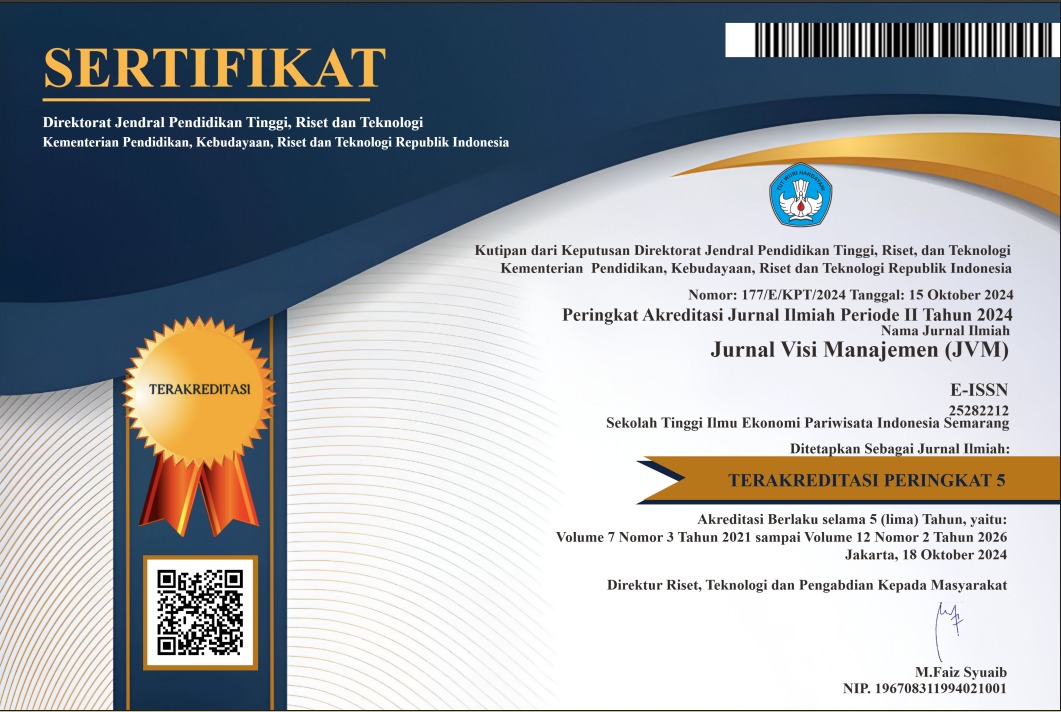Pengaruh ServQual Terhadap EWOM Melalui Trust dan E-Satisfaction Online Merchant
DOI:
https://doi.org/10.56910/jvm.v11i2.616Keywords:
E-satisfaction, E-wom, Servqual, Brand TrustAbstract
This study aims to analyze and explore more deeply the concept of electronic word of mouth (eWOM) by examining the role of electronic service quality, with trust as an exogenous variable and electronic satisfaction as a mediating variable. The phenomenon of consumer behavior in the context of e-commerce continues to grow in line with the rapid increase in internet users. In Indonesia, internet users are projected to reach 72.8 million people, making the country the third-largest in internet penetration among ASEAN nations. This surge in internet usage has significantly influenced online shopping behavior, especially among digital-savvy consumers. However, this trend contrasts sharply with the declining performance of offline retail, as shopping centers are witnessing a drop in consumer visits. This decline is largely driven by three major factors: (1) shifting consumer preferences, (2) decreasing employment in physical retail sectors, and (3) a rapid rise in the number of online stores.The research utilizes primary data, collected from respondents who have made online purchases from two major marketplaces in Indonesia—Tokopedia and Lazada. The data were analyzed using the Smart PLS software to test the relationships between the variables. The results indicate that electronic service quality has a positive and significant effect on eWOM when mediated by trust. However, the direct effects of service quality and satisfaction on eWOM were found to be statistically insignificant. The findings suggest that building customer trust through enhanced service quality is a strategic priority for e-commerce platforms aiming to encourage consumers to share positive online recommendations.
References
Ahn, T., Ryu, S., & Han, I. (2007). The impact of Web quality and playfulness on user acceptance of online retailing. Information & Management, 44(3), 263–275.
Ajzen, I., & Fishbein, M. (1977). Attitude-behavior relations: A theoretical analysis and review of empirical research. Psychological Bulletin, 84(5), 888.
APJII. (n.d.). Survei Internet APJII 2024. https://survei.apjii.or.id/
Cheung, C. M. K., & Thadani, D. R. (2012). The impact of electronic word-of-mouth (eWOM) on consumer purchase decision: An empirical study of the online travel community. Journal of Business Research, 65(10), 1438–1447.
Chiu, C. M., Hsu, M. H., & Wang, E. T. (2013). Understanding the factors that influence users’ continuance intention to use cloud computing. Computers in Human Behavior, 29(2), 531–541.
DeLone, W. H., & McLean, E. R. (2003). The DeLone and McLean model of information systems success: A ten-year update. Journal of Management Information Systems, 19(4), 9–30.
Gabrielle Margaret Lay, A., & Marvianta, Y. A. (2022). Pengaruh kualitas layanan, electronic word of mouth (e-WOM), dan citra merek terhadap kepuasan dan loyalitas pada pelanggan aplikasi marketplace. Jurnal Bangun Manajemen, 1(2), 90–99. https://doi.org/10.56854/jbm.v1i2.99
Grabner-Kräuter, S., & Kaluscha, E. A. (2003). Empirical research in on-line trust: A review and critical assessment. International Journal of Human-Computer Studies, 58(6), 783–812.
Grewal, D., & Levy, M. (2009). E-service quality: A conceptual framework and empirical investigation. Journal of Retailing, 85(1), 31–47.
Gultom, D. K., Arif, M., & Fahmi, M. (2020). Determinasi kepuasan pelanggan terhadap loyalitas pelanggan melalui kepercayaan. Maneggio: Jurnal Ilmiah Magister Manajemen, 3(2), 171–180.
Gunasekaran, A., Subramanian, N., & Papadopoulos, T. (2017). Information technology for competitive advantage within logistics and supply chains: A review. Transportation Research Part E: Logistics and Transportation Review, 99, 14–33.
Hasan, A. (2010). Pemasaran dari mulut-ke-mulut. Yogyakarta: Media Presindo.
Hsu, M. H., Chiu, C. M., & Ju, T. L. (2013). Determinants of continued use of social media: The case of Facebook. Information Systems Journal, 23(3), 165–190.
Kartika, Y., & Shihab, M. S. (2019). Membangun positive e-WOM melalui e-service quality, kepercayaan dan kepuasan. Journal of Entrepreneurship, Management and Industry (JEMI), 2(4), 195–204. https://doi.org/10.36782/jemi.v2i4.1942
Khatimah, B. N., Yuliana, R., & Hamdani, M. (2023). Peningkatan penjualan di marketplace Shopee pada era digitalisasi. EconBank: Journal of Economics and Banking, 5(2), 293–301. https://doi.org/10.35829/econbank.v5i2.340
Kim, D. J., & Ferrin, D. L. (2010). Trust and betrayal in the workplace: A social exchange perspective. Academy of Management Review, 35(3), 571–596.
Kotler, P., & Keller, K. L. (2009). Manajemen pemasaran (Edisi ke-13). Jakarta: Erlangga.
Luo, X., & Zhang, J. (2016). The impact of customer participation on eWOM. Journal of Business Research, 69(1), 283–289.
Minor, M., & Mowen, J. C. (2002). Perilaku konsumen. Jakarta: Erlangga.
Pamungkas, Z. A. (2021). Pengaruh citra merek, kualitas pelayanan dan kualitas produk terhadap eWOM dengan kepuasan konsumen sebagai variabel mediasi (Studi pada UD ‘Harum Manis’ UKM oleh-oleh dan souvenir khas Kota Batu). Managemen and Bussiness Riview (MBR), 5(2), 1–10.
Rahmi Yuliana, M. H. (2020). Study of online buying intention. International Journal of Economics, Business and Accounting Research (IJEBAR), 2020(4), 1158–1163.
Shih, Y.-Y., & Fang, K. (2006). Effects of network quality attributes on customer adoption intentions of internet banking. Total Quality Management & Business Excellence, 17(1), 61–77.
Tjiptono, F., & Chandra, G. (2010). Pemasaran strategik (Edisi ke-2). Yogyakarta: Penerbit Andi.
Vazquez, D., & Xu, X. (2009). Investigating linkages between online purchase behaviour variables. International Journal of Retail & Distribution Management, 37(5), 408–419.
Yusuf, O. (2014). Pengguna internet Indonesia nomor enam dunia. Diakses pada 17. [URL tidak tersedia]
Zeithaml, V. A., Parasuraman, A., & Malhotra, A. (2002). Service quality delivery through web sites: A critical review of extant knowledge. Journal of the Academy of Marketing Science, 30(4), 362–375.
Downloads
Published
How to Cite
Issue
Section
License
Copyright (c) 2025 Jurnal Visi Manajemen

This work is licensed under a Creative Commons Attribution-ShareAlike 4.0 International License.







